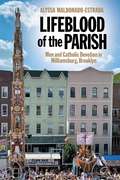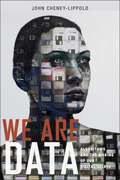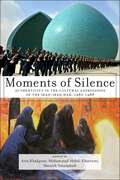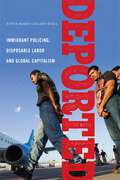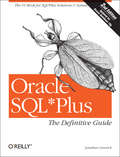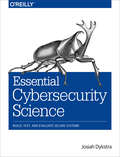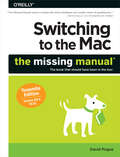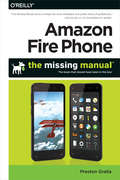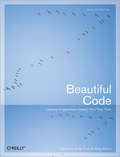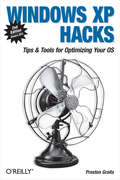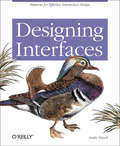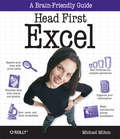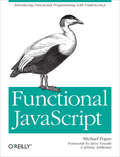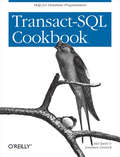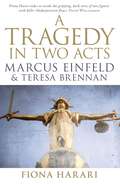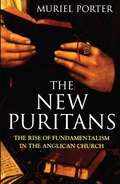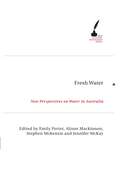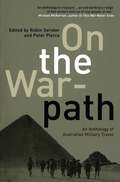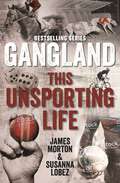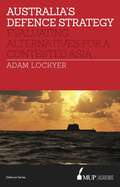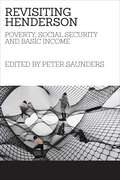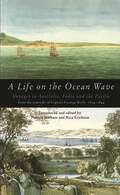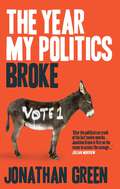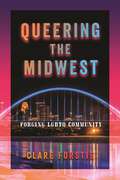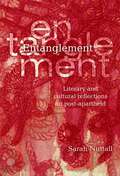- Table View
- List View
Lifeblood of the Parish: Men and Catholic Devotion in Williamsburg, Brooklyn (North American Religions #4)
by Alyssa Maldonado-EstradaA New York City ethnography that explores men's unique approaches to Catholic devotionEvery Saturday, and sometimes on weekday evenings, a group of men in old clothes can be found in the basement of the Shrine Church of Our Lady of Mount Carmel in Williamsburg, Brooklyn. Each year the parish hosts the Feast of Our Lady of Mount Carmel and San Paolino di Nola. Its crowning event is the Dance of the Giglio, where the men lift a seventy-foot tall, four-ton tower through the streets, bearing its weight on their shoulders.Drawing on six years of research, Alyssa Maldonado-Estrada reveals the making of this Italian American tower, as the men work year-round to prepare for the Feast. She argues that by paying attention to this behind-the-scenes activity, largely overlooked devotional practices shed new light on how men embody and enact their religiosity in sometimes unexpected ways.Lifeblood of the Parish evocatively and accessibly presents the sensory and material world of Catholicism in Brooklyn, where religion is raucous and playful. Maldonado-Estrada here offers a new lens through which to understand men’s religious practice, showing how men and boys become socialized into their tradition and express devotion through unexpected acts like painting, woodworking, fundraising, and sporting tattoos. These practices, though not usually considered religious, are central to the ways the men she studied embodied their Catholic identity and formed bonds to the church.
We Are Data: Algorithms and the Making of Our Digital Selves
by John Cheney-LippoldWhat identity means in an algorithmic age: how it works, how our lives are controlled by it, and how we can resist itAlgorithms are everywhere, organizing the near limitless data that exists in our world. Derived from our every search, like, click, and purchase, algorithms determine the news we get, the ads we see, the information accessible to us and even who our friends are. These complex configurations not only form knowledge and social relationships in the digital and physical world, but also determine who we are and who we can be, both on and offline. Algorithms create and recreate us, using our data to assign and reassign our gender, race, sexuality, and citizenship status. They can recognize us as celebrities or mark us as terrorists. In this era of ubiquitous surveillance, contemporary data collection entails more than gathering information about us. Entities like Google, Facebook, and the NSA also decide what that information means, constructing our worlds and the identities we inhabit in the process. We have little control over who we algorithmically are. Our identities are made useful not for us—but for someone else. Through a series of entertaining and engaging examples, John Cheney-Lippold draws on the social constructions of identity to advance a new understanding of our algorithmic identities. We Are Data will educate and inspire readers who want to wrest back some freedom in our increasingly surveilled and algorithmically-constructed world.
Moments of Silence: Authenticity in the Cultural Expressions of the Iran-Iraq War, 1980-1988
by Arta Khakpour Shouleh Vatanabadi Mohammed Mehdi KhorramiExplores how writers, filmmakers and artists have attempted to reckon with the legacy of a devastating warThe Iran-Iraq War was the longest conventional war of the 20th century. The memory of it may have faded in the wake of more recent wars in the region, but the harrowing facts remain: over one million soldiers and civilians dead, millions more permanently displaced and disabled, and an entire generation marked by prosthetic implants and teenage martyrdom. These same facts have been instrumentalized by agendas both foreign and domestic, but also aestheticized, defamiliarized, readdressed and reconciled by artists, writers, and filmmakers across an array of identities: linguistic (Arabic, Persian, Kurdish), religious (Shiite, Sunni, atheist), and political (Iranian, Iraqi, internationalist). Official discourses have unsurprisingly tried to dominate the process of production and distribution of war narratives. In doing so, they have ignored and silenced other voices. Centering on novels, films, memoirs, and poster art that gave aesthetic expression to the Iran-Iraq War, the essays gathered in this volume present multiple perspectives on the war’s most complex and underrepresented narratives. These scholars do not naively claim to represent an authenticity lacking in official discourses of the war, but rather, they call into question the notion of authenticity itself. Finding, deciding upon, and creating a language that can convey any sort of truth at all—collective, national, or private—is the major preoccupation of the texts and critiques in this diverse collection.
Deported: Immigrant Policing, Disposable Labor and Global Capitalism (Latina/o Sociology #6)
by Tanya Maria Golash-BozaWinner, 2016 Distinguished Contribution to Research Book Award, given by the American Sociological Association Latino/a SectionThe intimate stories of 147 deportees that exposes the racialized and gendered dimensions of mass deportations in the U.S.The United States currently is deporting more people than ever before: 4 million people have been deported since 1997 –twice as many as all people deported prior to 1996. There is a disturbing pattern in the population deported: 97% of deportees are sent to Latin America or the Caribbean, and 88% are men, many of whom were originally detained through the U.S. criminal justice system. Weaving together hard-hitting critique and moving first-person testimonials, Deported tells the intimate stories of people caught in an immigration law enforcement dragnet that serves the aims of global capitalism.Tanya Golash-Boza uses the stories of 147 of these deportees to explore the racialized and gendered dimensions of mass deportation in the United States, showing how this crisis is embedded in economic restructuring, neoliberal reforms, and the disproportionate criminalization of black and Latino men. In the United States, outsourcing creates service sector jobs and more of a need for the unskilled jobs that attract immigrants looking for new opportunities, but it also leads to deindustrialization, decline in urban communities, and, consequently, heavy policing. Many immigrants are exposed to the same racial profiling and policing as native-born blacks and Latinos. Unlike the native-born, though, when immigrants enter the criminal justice system, deportation is often their only way out. Ultimately, Golash-Boza argues that deportation has become a state strategy of social control, both in the United States and in the many countries that receive deportees.
Oracle SQL*Plus: The Definitive Guide
by Jonathan GennickDespite its wide availability and usage, few developers and DBAs have mastered the true power of Oracle SQLPlus. This bestselling book--now updated for Oracle 10g--is the only in-depth guide to this interactive query tool for writing SQL scripts. It's an essential resource for any Oracle user.The new second edition of Oracle SQLPlus: The Definitive Guide clearly describes how to perform, step-by-step, all of the tasks that Oracle developers and DBAs want to perform with SQLPlus--and maybe some you didn't realize you could perform.With Oracle SQLPlus: The Definitive Guide, you'll expertly:write and execute script filesgenerate ad hoc reportsextract data from the databasequery the data dictionary tablescustomize an SQLPlus environmentand much moreIt also includes a handy quick reference to all of its syntax options and an often-requested chapter on SQL itself, along with a clear, concise, and complete introduction.This book is truly the definitive guide to SQLPlus. It's an indispensable resource for those who are new to SQL*Plus, a task-oriented learning tool for those who are already using it, and an immediately useful quick reference for every user. If you want to leverage the full power and flexibility of this popular Oracle tool, you'll need this book.
Essential Cybersecurity Science: Build, Test, and Evaluate Secure Systems
by Josiah DykstraIf you’re involved in cybersecurity as a software developer, forensic investigator, or network administrator, this practical guide shows you how to apply the scientific method when assessing techniques for protecting your information systems. You’ll learn how to conduct scientific experiments on everyday tools and procedures, whether you’re evaluating corporate security systems, testing your own security product, or looking for bugs in a mobile game.Once author Josiah Dykstra gets you up to speed on the scientific method, he helps you focus on standalone, domain-specific topics, such as cryptography, malware analysis, and system security engineering. The latter chapters include practical case studies that demonstrate how to use available tools to conduct domain-specific scientific experiments.Learn the steps necessary to conduct scientific experiments in cybersecurityExplore fuzzing to test how your software handles various inputsMeasure the performance of the Snort intrusion detection systemLocate malicious “needles in a haystack” in your network and IT environmentEvaluate cryptography design and application in IoT productsConduct an experiment to identify relationships between similar malware binariesUnderstand system-level security requirements for enterprise networks and web services
Switching to the Mac: The Missing Manual, Yosemite Edition
by David PogueWhat makes Windows refugees decide to get a Mac? Enthusiastic friends? The Apple Stores? Great-looking laptops? A "halo effect" from the popularity of iPhones and iPads? The absence of viruses and spyware? The freedom to run Windows on a Mac? In any case, there’s never been a better time to switch to OS X—and there’s never been a better, more authoritative book to help you do it.The important stuff you need to know:Transfer your stuff. Moving files from a PC to a Mac by cable, network, or disk is the easy part. But how do you extract your email, address book, calendar, Web bookmarks, buddy list, desktop pictures, and MP3 files? Now you’ll know.Recreate your software suite. Many of the PC programs you’ve been using are Windows-only. Discover the Mac equivalents and learn how to move data to them.Learn Yosemite. Apple’s latest operating system is faster, smarter, and more in tune with iPads and iPhones. If Yosemite has it, this book covers it.Get the expert view. Learn from Missing Manuals creator David Pogue—author of OS X Yosemite: The Missing Manual, the #1 bestselling Mac book on earth.
Amazon Fire Phone: The Missing Manual
by Preston GrallaUnleash the powers of the Amazon Fire phone with help from technology guru Preston Gralla. Through clear instructions and savvy advice, this fast-paced, engaging guide shows you how to make the most of Fire phone’s innovative features—including Firefly, Dynamic Perspective, one-handed gestures, and integration with Amazon Prime.The important stuff you need to know:Gain control with Dynamic Perspective. Tilt your phone to scroll, move your head to play games, and explore maps in 3D.Take pictures further. Capture high-res, panoramic, and moving (lenticular) photos. Shoot HD video, too.Shop with ease. Use Firefly to identify music, videos, and other items, and go straight to the product’s Amazon page.Get the apps you want. Load up on games and apps for productivity, health and fitness, and social networking from Amazon’s Appstore.Solve problems right away. Get live tech support from Amazon via video chat with the Mayday help feature.Carry the Cloud in your hand. Access Prime Instant Video, your Kindle library, and your uploaded photos and videos.
Beautiful Code: Leading Programmers Explain How They Think
by Andy Oram Greg WilsonHow do the experts solve difficult problems in software development? In this unique and insightful book, leading computer scientists offer case studies that reveal how they found unusual, carefully designed solutions to high-profile projects. You will be able to look over the shoulder of major coding and design experts to see problems through their eyes.This is not simply another design patterns book, or another software engineering treatise on the right and wrong way to do things. The authors think aloud as they work through their project's architecture, the tradeoffs made in its construction, and when it was important to break rules.This book contains 33 chapters contributed by Brian Kernighan, KarlFogel, Jon Bentley, Tim Bray, Elliotte Rusty Harold, Michael Feathers,Alberto Savoia, Charles Petzold, Douglas Crockford, Henry S. Warren,Jr., Ashish Gulhati, Lincoln Stein, Jim Kent, Jack Dongarra and PiotrLuszczek, Adam Kolawa, Greg Kroah-Hartman, Diomidis Spinellis, AndrewKuchling, Travis E. Oliphant, Ronald Mak, Rogerio Atem de Carvalho andRafael Monnerat, Bryan Cantrill, Jeff Dean and Sanjay Ghemawat, SimonPeyton Jones, Kent Dybvig, William Otte and Douglas C. Schmidt, AndrewPatzer, Andreas Zeller, Yukihiro Matsumoto, Arun Mehta, TV Raman,Laura Wingerd and Christopher Seiwald, and Brian Hayes.Beautiful Code is an opportunity for master coders to tell their story. All author royalties will be donated to Amnesty International.
Windows XP Hacks: Tips & Tools for Customizing and Optimizing Your OS
by Preston GrallaA smart collection of insider tips and tricks, Windows XP Hacks, Second Edition covers the XP operating system from start to finish. Among the multitude of topics addressed, this must-have resource includes extensive coverage of hot-button issues such as:securityweb browsingcontrolling the control panelremoving uninstallable XP componentspop-up adsYou'll also find timesaving hacks for file distribution; digital media, such as iTunes; and high-visibility web software, services, and exploits that have emerged since the book's last edition. Each hack in the book can be read easily in just a few minutes, saving countless hours of searching for the right answer.Now completely revised and updated to cover Service Pack 2 (SP2), the second edition of this bestseller carefully breaks down the new features that come with SP2, including IE pop-up blocker, Windows Firewall, and the new wireless client.Written by Preston Gralla, the compact and affordable Windows XP Hacks, Second Edition provides direct, hands-on solutions that can be applied to the challenges facing XP beginners, as well as the more experienced power user. Each year, Windows XP is pre-installed on 90 million PCs worldwide, making it the world's most popular operating system.
Designing Interfaces: Patterns for Effective Interaction Design
by Jenifer TidwellDesigning a good interface isn't easy. Users demand software that is well-behaved, good-looking, and easy to use. Your clients or managers demand originality and a short time to market. Your UI technology -- web applications, desktop software, even mobile devices -- may give you the tools you need, but little guidance on how to use them well.UI designers over the years have refined the art of interface design, evolving many best practices and reusable ideas. If you learn these, and understand why the best user interfaces work so well, you too can design engaging and usable interfaces with less guesswork and more confidence.Designing Interfaces captures those best practices as design patterns -- solutions to common design problems, tailored to the situation at hand. Each pattern contains practical advice that you can put to use immediately, plus a variety of examples illustrated in full color. You'll get recommendations, design alternatives, and warningson when not to use them.Each chapter's introduction describes key design concepts that are often misunderstood, such as affordances, visual hierarchy, navigational distance, and the use of color. These give you a deeper understanding of why the patterns work, and how to apply them with more insight.A book can't design an interface for you -- no foolproof design process is given here -- but Designing Interfaces does give you concrete ideas that you can mix and recombine as you see fit. Experienced designers can use it as a sourcebook of ideas. Novice designers will find a roadmap to the world of interface and interaction design, with enough guidance to start using these patterns immediately.
Head First Excel: A learner's guide to spreadsheets
by Michael MiltonDo you use Excel for simple lists, but get confused and frustrated when it comes to actually doing something useful with all that data? Stop tearing your hair out: Head First Excel helps you painlessly move from spreadsheet dabbler to savvy user. Whether you're completely new to Excel or an experienced user looking to make the program work better for you, this book will help you incorporate Excel into every aspect of your workflow, from a scratch pad for data-based brainstorming to exploratory analysis with PivotTables, optimizing outcomes with Goal Seek, and presenting your conclusions with sophisticated data visualizations.Organize and clearly present information in a spreadsheetMake calculations across a number of worksheetsChange your point of view with sorting, zooming, and filteringManipulate numerical data to extract and use just what you needLeverage Excel as a grid-based layout programWrite formulas for optimal functionalityNest formulas for more complex operationsCreate sophisticated data visualizations with charts and graphsUse Goal Seek to optimize possible outcomes based on different assumptionsCreate summaries from large data sets for exploratory data analysis with PivotTablesWe think your time is too valuable to waste struggling with new concepts. Using the latest research in cognitive science and learning theory to craft a multi-sensory learning experience, Head First Excel uses a visually rich format designed for the way your brain works, rather than a text-heavy approach that will put you to sleep.
Functional JavaScript: Introducing Functional Programming with Underscore.js
by Michael FogusHow can you overcome JavaScript language oddities and unsafe features? With this book, you’ll learn how to create code that’s beautiful, safe, and simple to understand and test by using JavaScript’s functional programming support. Author Michael Fogus shows you how to apply functional-style concepts with Underscore.js, a JavaScript library that facilitates functional programming techniques. Sample code is available on GitHub at https://github.com/funjs/book-source. Fogus helps you think in a functional way to help you minimize complexity in the programs you build. If you’re a JavaScript programmer hoping to learn functional programming techniques, or a functional programmer looking to learn JavaScript, this book is the ideal introduction. Use applicative programming techniques with first-class functions Understand how and why you might leverage variable scoping and closures Delve into higher-order functions—and learn how they take other functions as arguments for maximum advantage Explore ways to compose new functions from existing functions Get around JavaScript’s limitations for using recursive functions Reduce, hide, or eliminate the footprint of state change in your programs Practice flow-based programming with chains and functional pipelines Discover how to code without using classes
Transact-SQL Cookbook: Help for Database Programmers
by Jonathan Gennick Ales SpeticThis unique cookbook contains a wealth of solutions to problems that SQL programmers face all the time. The recipes inside range from how to perform simple tasks, like importing external data, to ways of handling issues that are more complicated, like set algebra. Authors Ales Spetic and Jonathan Gennick, two authorities with extensive database and SQL programming experience, include a discussion with each recipe to explain the logic and concepts underlying the solution.SQL (Structured Query Language) is the closest thing to a standard query language that currently exists, and Transact-SQL -- a full-featured programming language that dramatically extends the power of SQL -- is the procedural language of choice for both Microsoft SQL Server and Sybase SQL Server systems. The Transact-SQL Cookbook is designed so you can use the recipes directly, as a source of ideas, or as a way to learn a little more about SQL and what you can do with it. Topics covered include:Audit logging. In addition to recipes for implementing an audit log, this chapter also includes recipes for: improving performance where large log tables are involved; supporting multiple-languages; and simulating server push.Hierarchies. Recipes show you how to manipulate hierarchical data using Transact-SQL.Importing data. This chapter introduces concepts like normalization and recipes useful for working with imported data tables.Sets. Recipes demonstrate different operations, such as how to find common elements, summarize the data in a set, and find the element in a set that represents an extreme.Statistics. This chapter?s recipes show you how to effectively use SQL for common statistical operations from means and standard deviations to weighted moving averages.Temporal data. Recipes demonstrate how to construct queries against time-based data.Data Structures. This chapter shows how to manipulate data structures like stacks, queues, matrices, and arrays.With an abundance of recipes to help you get your job done more efficiently, the Transact-SQL Cookbook is sure to become an essential part of your library.
Tragedy In Two Acts: Marcus Einfeld And Teresa Brennan
by Fiona HarariThis was not the ending either of them expected. Marcus Einfeld, former Federal Court judge and human rights champion, and his old friend Teresa Brennan, an exuberant, sometimes controversial US-based academic, had each spent years establishing demanding careers and international reputations, to create two lives that, on paper at least, exuded success. Then Einfeld was caught speeding. But rather than pay a small fine, the former judge told a court that Brennan had been driving his car. In reality she had been dead for three years. Through a chain of events that at times seemed exceedingly unlikely, Einfeld's lie was exposed, with once unimaginable consequences. His world, and virtually every honour he had earned, rapidly disappeared. And his old friend Brennan, who had died in suspicious circumstances, was suddenly, posthumously, attracting attention for all the wrong reasons. This is the remarkable story of two outstanding Australians whose lives have been lived large, and who, ultimately, have been bound by tragedy.
New Puritans: The Rise of Fundamentalism in the Anglican Church
by Muriel PorterReligious fundamentalism is a growing force in Australian society, but it is not confined to conservative Islam or to fringe denominations. In The New Puritans, Muriel Porter explains how the mainstream Anglican Church in this country is influenced by the ideological agendas of its largest and richest diocese, Sydney. Over the past few decades, Sydney Anglicans have increasingly modelled themselves on the sixteenth-century English Puritans. They have radically altered church services, relentlessly opposed all attempts to extend full equality to women in the Church, and joined forces with conservative Anglicans worldwide to prevent the blessing of same-sex partnerships and the ordination of gay people. Under the leadership of the charismatic Jensen brothers—Peter, the Archbishop of Sydney, and his brother Phillip, the Dean—Sydney poses a growing threat to mainstream Anglicanism. The New Puritans explores the Diocese's impact on the Church in Australia and internationally.
Fresh Water: New Perspectives on Water in Australia
by Emily Potter Alison Mackinnon Stephen McKenzie Jennifer McKayIs water a resource or is it the source? Is it something to be consumed or does it have a life of its own? Recent histories of environmental misunderstanding and exploitation shadow our current regime of water management and use. While governments grapple with how to respond to widespread drought, the situation worsens. There is something amiss in current approaches to water. This timely collection of essays addresses the critical and contentious issue of water in Australia today and suggests a need to radically rethink our relationship with this fundamental substance. Contributors from a range of fields, from anthropology to visual arts, discuss the various ways in which we are caught up with water, and challenge us to take up the cultural transformations that underpin a sustainable ecological future.
On The War-path: An Anthology of Australian Military Travel
by Peter Pierce Robin GersterThis important anthology reveals the many ways in which going to war has formed a cultural bridge between Australia and the world. From the Sudan in 1885 to Afghanistan in 2001, the connection of war to travel is illustrated in the observations of writers as varied as 'Banjo' Paterson, George Johnston, Nancy Wake, John Pilger, Lily Brett and Peter Weir. Selecting writings from combatants abroad as well as the reflections of sightseers who travel to foreign battlefields and war sites, Robin Gerster and Peter Pierce reveal how the experience of war has both broadened and refined (and sometimes distorted) Australian views of the world. Their lively collection crosses the boundaries between literature, literary criticism, travel writing, war writing and cultural commentary.
Gangland This Unsporting Life
by James Morton Susanna LobezSport has always attracted organised crime. Huge sums of money are wagered in every arena, and rorts, swindles and unsporting behaviour have shadowed players of all codes. Cricket and footy are not immune, with Heath Shaw and Ben Cousins caught up in gambling and drugs, and NRL star Ryan Tandy in match-fixing. Plenty of punters have criminal connections-Alphonse Gangitano and the Moran brothers. Drugs play a major part on and off the fields of play (looking at you, Essendon Football Club and Cronulla-Sutherland Sharks) with horses and greyhounds also routinely doped. James Morton and Susanna Lobez investigate the cheating underbelly of sport, from the first cricket pitch invasion in the 1890s through to the contemporary scandals that will leave you wondering if there is such a thing as a sporting chance.
Australia's Defence Strategy: Evaluating Alternatives for a Contested Asia
by Adam LockyerHow would we know a good defence strategy if we saw one? The Asian Century is challenging many of the traditional assumptions at the heart of Australian defence policy and strategy. Defence scholars have risen to the challenge of these transformational times and have collectively produced a smorgasbord of alternatives for policy-makers. The problem is that these recommendations all point in very different directions. How should we evaluate these options? Adam Lockyer tackles this question and develops a novel conceptual framework for evaluating defence strategies. By doing so, this book breaks new theoretical ground and makes an important contribution to our understanding of strategy in general and defence strategy in particular. Lockyer then applies this analytical tool to the leading arguments in Australia's defence debate and finds that there is still substantial work to be done. Lockyer concludes by proposing a new Australian defence strategy for a contested Asia that would pass the test for a 'good' defence strategy. The result is essential reading for anyone interested in strategy or the future of Australian defence policy.
Revisiting Henderson: Poverty, social security and basic income
by Peter SaundersReform of the system must recognise, respect and reinforce its profound impact on the lives and wellbeing of millions of Australians, not only during childhood and retirement but also when unexpected needs arise in-between. It is time for a fundamental reassessment of how the system can best promote social inclusion and encourage economic contribution in current and future circumstances. This book brings together leading social security researchers and policy analysts to reflect on past trends, the key changes that the system must adapt to and what this will involve. Its contributors share a vision inspired by the groundbreaking work of Ronald Henderson, who argued for a debate that is grounded in evidence and informed by a coherent set of principles. The book's chapters highlight the weaknesses of the current system and propose viable alternatives, showing that there is no lack of new ideas on which to draw. One of these-the introduction of a basic income as Henderson recommended in the 1970s-is used to illustrate the need for a better understanding of what such reforms can offer today and how they might work in practice.
Life On The Ocean Wave
by Rica Erickson Pamela StathamEncounters with cannibals, convicts and pirates were just some of the highlights of eleven long journeys under sail Captain George Bayly made around the world in the early nineteenth century. The journal Captain Bayly kept of his travels is notable for the historical significance of his voyages, and the writer's eye for a good story. It contains eyewitness accounts of the transportation of male and female convicts to Australia, the voyage of British immigrants to the ill-fated settlement attempted by Thomas Peel near Perth, hostilities between Maoris and Europeans, and trading voyages to and from China. Captain Bayly's stories of typhoons, floods, heroic rescues, shipboard quarrels and deaths give the book appeal to a wide audience. The journal's depiction of the infant Australian settlements as just part of a widely-flung network of British colonial outposts in the nineteenth century also provide an insight into the nation's economic development.
Year My Politics Broke
by Jonathan GreenIs there more to politics than politics? What about sincere belief? Or conviction? Both are missing in action, trumped by political expedience. We've just sat through an election campaign in which the major parties fought a pitched battle over precious little, two bitterly adversarial political organisations scrambling desperately for the middle ground, aiming for the broadest common denominator. But the problem is bigger than just this election. We are living through a moment in which the pursuit of power seems the sole objective of political activity. True for Julia Gillard, Kevin Rudd and Tony Abbott. Shouldn't someone hold them to account? Our political media perhaps? Why does it just report politics as show business? The sum of it leaves the rest of us short-changed. In The Year My Politics Broke, Jonathan Green looks at where politics, truth and disconnection collide.
Queering the Midwest: Forging LGBTQ Community
by Clare ForstieHow LGBTQ community life in a small Midwestern city differs from that in larger cities with established gayborhoodsRiver City is a small, Midwestern, postindustrial city surrounded by green hills and farmland with a population of just over 50,000. Most River City residents are white, working-class Catholics, a demographic associated with conservative sexual politics. Yet LGBTQ residents of River City describe it as a progressive, welcoming, and safe space, with active LGBTQ youth groups and regular drag shows that test the capacity of bars.In this compelling examination of LGBTQ communities in seemingly “unfriendly” places, Queering the Midwest highlights the ambivalence of LGBTQ lives in the rural Midwest, where LGBTQ organizations and events occur occasionally but are generally not grounded in long-standing LGBTQ institutions. Drawing on in-depth interviews and ethnographic observation, Clare Forstie offers the story of a community that does not fit neatly into a narrative of progress or decline. Rather, this book reveals the contradictions of River City’s LGBTQ community, where people feel both safe and unnoticed, have a sense of belonging and persistent marginalization, and have friendships that do and don’t matter. These “ambivalent communities” in small Midwestern cities challenge the ways we think about LGBTQ communities and relationships and push us to embrace the contradictions, failures, and possibilities of LGBTQ communities across the American Midwest.
Entanglement: Literary and cultural reflections on post-apartheid
by Sarah NuttallThis original book is a much needed and far reaching exploration of post-apartheid South African life worlds. Entanglement aims to capture the contradictory mixture of innovation and inertia, of loss, violence and xenophobia as well as experimentation and desegregation, which characterises the present. The author explores the concept of entanglement in relation to readings of literature, new media forms and painting. In the process, she moves away from a persistent apartheid optic, drawing on ideas of sameness and difference, and their limits, in order to elicit ways of living and imagining that are just starting to take shape and for which we might not yet have a name. In the background of her investigations lies a preoccupation with a future-oriented politics, one that builds on largely unexplored terrains of mutuality while being attentive to a historical experience of confrontation and injury.
